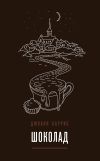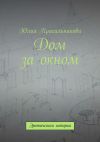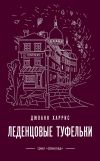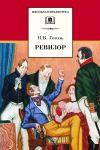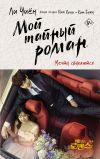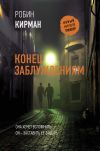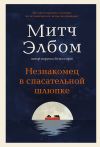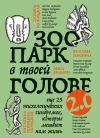Текст книги "Шоколад / Chocolat"

Автор книги: Джоанн Харрис
Жанр: Современная зарубежная литература, Современная проза
Возрастные ограничения: +16
сообщить о неприемлемом содержимом
Текущая страница: 8 (всего у книги 38 страниц) [доступный отрывок для чтения: 12 страниц]
16
Wednesday, February 26
When i opened this morning roux was waiting at the door. He was wearing denim overalls, and his hair was tied back with string. He looked to have been waiting for some time, because his hair and shoulders were furred with droplets from the morning mist. He gave me something that was not quite a smile, then looked behind me into the shop where Anouk was playing.
“Hello, little stranger,” he said to her. This time the smile was real enough, lighting his wary face briefly.
“Do come in.” I beckoned him inside. “You should have knocked. I didn’t see you out there.”
Roux muttered something in his thick Marseille accent and crossed the threshold rather self-consciously. He moves with an odd combination of grace and clumsiness, as if he feels uncomfortable indoors.
I poured him a tall glass of black chocolate laced with kahlua.
“You should have brought your friends,” I told him lightly.
He gave a shrug in reply. I could see him looking around, taking in his surroundings with keen, if suspicious, interest.
“Why don’t you sit down?”
I asked, pointing to the stools at the counter. Roux shook his head.
“Thanks.” He took a mouthful of the chocolate. “Actually, I wondered if you’d be able to help me. Us.” He sounded embarrassed and angry at the same time. “It isn’t money,” he added quickly, as if to prevent me from speaking. “We’d pay for it all right: It’s just the – organization – we’re having difficulty with.” He shot me a look of unfocused resentment. “Armande – Madame Voizin – said you’d help,” he said.
He explained the situation as I listened quietly, nodding encouragement on occasion. I began to understand that what I had taken for inarticulacy was simply a deep dislike of having to ask for help. Through the thick accent Roux spoke like an intelligent man. He had promised Armande that he would repair her roof, he explained. It was a relatively easy job which would take only a couple of days. Unfortunately the only local supplier of wood, paint and the other materials needed to complete the task was Georges Clairmont, who flatly refused to supply them to either Armande or Roux. If Mother wanted repairs to her roof, he told her reasonably, then she should ask him, not a bunch of swindling vagrants. It wasn’t as if he hadn’t been asking – begging – her to let him do the work free of charge for years. Let the gypsies into her house and God only knew what might happen. Valuables looted, money stolen… It wasn’t unknown for an old woman to be beaten or killed for the sake of her few poor possessions. No. It was an absurd scheme, and in all conscience he couldn’t?
“Sanctimonious bastard,” said Roux viciously. “Knows nothing about us – nothing! The way he talks, we’re all thieves and murderers. I’ve always paid my way. I’ve never begged from anyone, I’ve always worked?”
“Have some more chocolate,” I suggested mildly, pouring another glassful. “Not everybody thinks like Georges and Caroline Clairmont.”
“I know that.”
His posture was defensive, arms crossed over his body.
“I’ve used Clairmont to do repairs for me before,” I continued. “I’ll tell him I want to do some more work on the house. If you give me a list of what you need, I’ll get it.”
“I’ll pay for it all,” said Roux again, as if this issue of payment were something he could not stress enough. “The money really isn’t a problem.”
“Of course.”
He relaxed a little and drank more chocolate. For the first time he seemed to register how good it was, and gave me a smile of sudden and peculiar sweetness.
“She’s been good to us, Armande,” he said. “She’s been ordering food supplies for us, and medicine for Zezette’s baby. She stood up for us when that poker-faced priest of yours turned up again.”
“He’s no priest of mine,” I interrupted quickly. “In his mind, I’m as much of an interloper in Lansquenet as you are.”
Roux looked at me in surprise.
“No, really,” I told him. “I think he sees me as a corrupting influence. Chocolate orgies every night. Fleshly excesses when decent people should be in bed, alone.”
His eyes are the hazy no-colour of a city skyline in the rain. When he laughs they gleam with malice. Anouk, who had been sitting in uncharacteristic silence while he spoke, responded to it and laughed too.
“Don’t you want any breakfast?” piped Anouk. “We’ve got pain au chocolat. We’ve got croissants too, but the pain au chocolat is better.”
He shook his head.
“I don’t think so,” he said. “Thanks.”
I put one of the pastries on a plate and set it beside him.
“On the house,” I told him. “Try one, I make them myself.”
Somehow it was the wrong thing to say. I saw his face close again, the flicker of humour replaced by the now familiar look of careful blankness.
“I can pay,” he said with a kind of defiance. “I’ve got money.”
He struggled to pull out a handful of coins from his overall pocket. Coins rolled across the counter.
“Put that away,” I told him.
“I told you, I can pay.” Stubborn now, igniting into rage. “I don’t need – ”
I put my hand on his. I felt resistance for a moment, then his eyes met mine.
“Nobody needs to do anything,” I said gently. I realized I had hurt his pride with my show of friendship. “I invited you.” The look of hostility remained unchanged. “I did the same with everyone else,” I persisted. “Caro Clairmont. Guillaume Duplessis. Even Paul-Marie Muscat, the man who ran you out of the cafe.” A second’s pause for him to register that. “What makes you so special, that you can refuse when none of them did?”
He looked ashamed then, mumbling something under his breath in his thick dialect. Then his eyes met mine again and he smiled.
“Sorry,” he said. “I didn’t understand.” He paused awkwardly for a few moments before picking up the pastry. “But next time you’re the ones invited to my place,” he said firmly. “And I shall be most offended if you refuse.”
He was all right after that, losing much of his constraint. We talked of neutral topics for a while, but soon progressed to other things. I learned that Roux had been on the river for six years, alone at first then travelling with a group of companions. He had been a builder once, and still earned money doing repair jobs and harvesting crops in summer and autumn. I gathered that there had been problems which forced him into the itinerant life, but knew better than to press for details.
He left immediately as soon as the first of my regulars arrived. Guillaume greeted him politely and Narcisse gave his brief nod of welcome, but I could not persuade Roux to stay to talk with them. Instead he crammed what remained of his pain au chocolat into his mouth and walked out of the shop with that look of insolence and aloofness he feels he has to affect with strangers.
As he reached the door he turned abruptly.
“Don’t forget your invitation,” he told me, as if on an afterthought. “Saturday night, seven o’clock. Bring the little stranger.”
Then he was gone, before I could thank him.
Guillaume lingered longer than usual over his chocolate. Narcisse gave his place to Georges, then Arnauld came over to buy three champagne truffles – always the same, three champagne truffles and a look of guilty anticipation – and Guillaume was still sitting in his usual place, a troubled look on his small-featured face. Several times I tried to draw him out, but he responded in polite monosyllables, his thoughts elsewhere. Beneath his seat Charly was limp and immobile.
“I spoke to Cure Reynaud yesterday,” he said at last, so abruptly that I gave a start. “I asked him what I ought to do about Charly.”
I looked at him enquiringly.
“It’s hard to explain to him,” continued Guillaume in his soft, precise voice. “He thinks I’m being stubborn, refusing to hear what the vet has to say. Worse still, he thinks I’m being foolish. It isn’t as if Charly were a person, after all.”
A pause during which I could hear the effort he was making to retain his control.
“Is it really that bad?”
I already knew the answer. Guillaume looked at me with sad eyes.
“I think so.”
“I see.”
Automatically he stooped to scratch Charly’s ear. The dog’s tail thumped in a perfunctory way, and he whined softly.
“There’s a good dog.” Guillaume gave me his small, bewildered smile. “Cure Reynaud isn’t a bad man. He doesn’t mean to sound cruel. But to say that – in such way – ”
“What did he say?”
Guillaume shrugged.
“He told me I’d been making a fool of myself over that dog for years now. That it was all the same to him what I did, but that it was ridiculous to coddle the animal as if it were a human being, or to waste my money on useless treatments for it.”
I felt a prick of anger.
“That was a spiteful thing to say.”
Guillaume shook his head.
“He doesn’t understand,” he said again. “He doesn’t really care for animals. But Charly and I have been together for so long – ” Tears stood in his eyes and he moved his head sharply to hide them.“I’m on my way to the vet’s now, just as soon as I’ve finished my drink.” His glass had been standing empty on the counter for over twenty minutes. “It might not be today, might it?” There was a note almost of desperation in his voice. “He’s still cheerful. He’s been eating better recently, I know he has. No-one can make me do it.” Now he sounded like a fractious child. “I’ll know when the time really comes. I’ll know.”
There was nothing I could say that would make him feel better. I tried, though. I bent to stroke Charly, feeling the closeness of bone to skin beneath my moving fingers. Some things can be healed. I made my fingers warm, probing gently, trying to see. The burr already seemed larger. I knew it was hopeless.
“He’s your dog, Guillaume,” I said. “You know best.”
“That’s right.” He seemed to brighten for a moment. “His medicine keeps the pain away. He doesn’t whine any more in the night.”
I thought of my mother in those last months. Her pallor, the way the flesh melted from her, revealing a delicate beauty of stripped bone, bleached skin. Her bright and feverish eyes – Florida sweetheart, New York, Chicago, the Grand Canyon, so much to see! – and her furtive cries in the night. “After a while you just have to stop,” I said. “It’s pointless. Hiding behind justifications, setting short-term goals to see out the week. After a while it’s the lack of dignity that hurts more than anything else. You need to rest.”
Cremated in New York; ashes scattered across the harbour. Funny, how you always imagine dying in bed, surrounded by your loved ones. Instead, too often, the brief bewildering encounter, the sudden realization, the slow motion panic ride with the sun coming up behind you like a swinging pendulum however much you try to outrun it…
“If I had a choice I’d take this one. The painless needle. The friendly hand. Better that than alone in the night, or under the wheels of a cab in a street where no-one stops to look twice.” I realized that without meaning to, I had spoken aloud. “I’m sorry, Guillaume,” I said, seeing his stricken look. “I was thinking about something else.”
“That’s all right,” he said quietly, putting the coins down onto the counter in front of him. “I was just going anyway.”
And picking up his hat with one hand and Charly with the other, he went out, stooping a little more than usual, a small drab figure carrying what might have been a sack of groceries or an old raincoat or something else altogether.
17
Saturday, March 1
I have been watching her shop. I realize that I have done so since her arrival, its comings and goings, its furtive gatherings. I watch it much as I used to watch wasps nests in my youth, with loathing and fascination. They began slyly at first, calling in the secret hours of dusk and early morning. They took the guise of genuine clients. A cup of coffee here, a packet of chocolate raisins for their children. But now they have abandoned the pretence. The gypsies call openly now, casting defiant looks at my shuttered window; the redhead with the insolent eyes, the skinny girl and the bleached-haired girl and the shaven headed Arab. She calls them by name; Roux and Zezette and Blanche and Ahmed. Yesterday at ten Clairmont’s van came by with a load of building supplies; wood and paint and roofing pitch. The lad who was driving it set the goods down on her doorstep without a word. She wrote him a cheque. Then I had to watch while her grinning friends lifted the boxes and joists and cartons onto their shoulders and bore them down, laughing, into Les Marauds. A ruse, that was all. A lying ruse. For some reason she wants to abet them. Of course it is to spite me that she acts in this way. I can do nothing but maintain a dignified silence and pray for her downfall. But she makes my task so much harder! Already I have to deal with Armande Voizin, who puts their food on her own shopping bill. I have already dealt with this, but too late. The river-gypsies have enough supplies now to last them a fortnight. They bring their daily supplies – bread, milk from Agen upriver. The thought that they might stay any longer fills me with bile. But what can be done, whilst such people befriend them? You would know what to do, pere, if only you could tell me. And I know you would not flinch from your duty, however unpleasant.
If only you could tell me what to do. The slightest pressure of the fingers would be enough. A flicker of an eyelash. Anything. Anything to show that I am forgiven. No? You do not move. Only the ponderous noise – hissh-thump! of the machine as it breathes for you, sending the air through your atrophied lungs. I know that one day soon you will awake, healed and purified, and that mine will be the first name you speak. You see, I do believe in miracles. I, who have passed through fire. I do believe.
I decided to talk to her today. Rationally, without recrimination, as father to daughter. Surely she would understand. We began on the wrong footing, she and I. Perhaps we could-begin again. You see, pere, I was ready to be generous. Ready to understand. But as I approached the shop I saw through the window that the man Roux was in there with her, his hard, light eyes fixed on me with that mocking look of disdain which all his kind affects. There was a drink of some sort in his hand. He looked dangerous, violent in his filthy overalls and long, loose, hair, and for a second I felt a thin stab of anxiety for the woman. Doesn’t she realize what dangers she is courting, just by being with these people? Does she not care for herself, for her child? I was about to turn away when a poster in the shop window caught my eye. I pretended to study it for a minute whilst secretly watching her watching them – from outside. She was wearing a dress of some rich wine-coloured material, and her hair was loose. From inside the shop I heard her laughter.
My eyes skimmed over the poster again. The writing was childish, unformed.
GRAND FESTIVAL CHOCOLAT
AT LA CELESTE PRALINE BEGINS EASTER SUNDAY EVERYONE WELCOME
I read it again, slow indignation dawning. Inside the shop I could still hear the sound of her voice above the clinking of glasses. Too absorbed in her conversation, she had still not noticed me, but stood with her back to the door, one foot turned out like a dancer. She wore flat pumps with little bows on them, and no stockings.
BEGINS EASTER SUNDAY
I see it all now. Her malice, her damnable malice. She must have planned this from the start, this chocolate festival, planned it to coincide with the most holy of the Church’s ceremonies. From her arrival on carnival day she must have had this in mind, to undermine my authority, to make a mockery of my teachings. She and her friends from the river.
Too angry now to withdraw, as I should have, I pushed the door and went into the shop. A brightly mocking carillon heralded my entrance, and she turned to look at me, smiling. If I had not that moment received irrefutable proof of her vindictiveness, I could have sworn that smile was genuine.
“Monsieur Reynaud.”
The air is hot and rich with the scent of chocolate. Quite unlike the light powdery chocolate I knew as a boy, this has a throaty richness like the perfumed beans from the coffee-stall on the market, a redolence of amaretto and tiramisu, a smoky, burnt flavour which enters my mouth somehow and makes it water. There is a silver jug of the stuff on the counter, from which a vapour rises. I recall that I have not breakfasted this morning.
“Mademoiselle.” I wish my voice were more commanding. Rage has tightened my throat and instead of the righteous bellow which I intended I release nothing but a croak of indignation, like a polite frog. “Mademoiselle Rocher.” She looks at me enquiringly. “I have seen your poster!”
“Thank you,” she says. “Would you join us in a drink?”
“No!”
Coaxingly: “My chococcino is wonderful if you have a delicate throat.”
“I do not have a delicate throat!”
“Don’t you?” Her voice is falsely solicitous. “I thought you sounded rather hoarse. A grand creme, then? Or a mocha?”
With an effort I regained my composure.
“I won’t trouble you, thank you.”
At her side the red haired man gives a low laugh and says something in his gutter patois. I notice his hands are streaked with paint, a pale tint which fills the creases in his palms and his knuckles. Has he been working? I ask myself uneasily. And if so, for whom? If this were Marseille the police would arrest him for working illegally. A search of his boat might reveal enough evidence – drugs, stolen property, pornography, weapons to put him away for good. But this is Lansquenet. Nothing short of serious violence would bring the police here.
“I saw your poster.” I begin again, with all the dignity I can muster.
She watches me with that look of polite concern, her eyes dancing.
“I have to say”– at this point I clear my throat, which has filled again with bile – “I have to say that I find your timing – the timing of your – event deplorable.”
“My timing?” She looks innocent. “You mean the Easter festival?” She gives a small, mischievous smile. “I rather thought your people were responsible for that. You ought to take it up with the Pope.”
I fix her with a cold stare.,
“I think you know exactly what I’m talking about.”
Again, that look of polite enquiry.
“Chocolate festival. All welcome.” My anger is rising like boiling milk, uncontrollable. For the instant I feel empowered, energized by its heat. I stab an accusing finger at her. “Don’t think I haven’t guessed what this is all about.”
“Let me guess.” Her voice is mild, interested. “It’s a personal attack on you. A deliberate attempt to undermine the foundations of the Catholic Church.” She gives a laugh which betrays itself in sudden shrillness. “God forbid that a chocolate shop should sell Easter eggs at Easter.”
Her voice is unsteady, almost afraid, though of what I am unsure. The redhaired man glares at me. With an effort she recovers, and the glimpse of fear I thought I saw in her is swallowed by her composure.
“I’m sure there’s room here for both of us,” she says evenly. “Are you sure you don’t want a drink of chocolate? I could explain what I – ”
I shake my head furiously, like a dog tormented by wasps. Her very calm infuriates me, and I can hear a kind of buzzing in my head, an unsteadiness which sends the room spinning about me. The creamy smell of chocolate is maddening. For a moment my senses are unnaturally enhanced; I can smell her perfume, a caress of lavender, the warm spicy scent of her skin. Beyond her, a whiff of the marshes, a musky tang of engine-oil and sweat and paint from her redhaired friend.
“I – no – I…” Nightmarishly, I have forgotten what I intended to say. Something about respect, I think, about the community. About pulling together in the same direction, about righteousness, decency, about morality. Instead I gulp air, my head swimming. “I–I…”
I cannot shake the thought that she is doing this, pulling the threads of my senses apart, reaching into my mind.
She leans forward, pretending solicitude, and her scent assails me once more.
“Are you all right?” I hear her voice from a great distance. “Monsieur Reynaud, are you all right?”
I push her away with trembling hands.
“Nothing.” At last I manage to speak. “An – indisposition. Nothing. I’ll bid you good – ”
Blindly I stumble towards the door. A red sachet suspended from the door-jamb brushes my face more of her superstition – and I cannot shake off the absurd impression that the ridiculous thing is responsible for my malaise; herbs and bones sewn together and hung there to trouble my mind. I stagger out into the street, gasping for breath.
My head clears as soon as the rain touches it, but I keep walking. Walking.
I did not stop until I reached you, mon pere. My heart was pounding, my face running with sweat, but at last I feel purged of her presence. Was this what you felt, mon pere, that day in the old chancery? Did temptation wear this face?
The dandelions are spreading, their bitter leaves pushing up the black earth, their white roots forking deep, biting hard. Soon they will be in bloom. I will walk home via the river, pare, to observe the small floating city which even now grows, spreads across the swollen Tannes. More boats have arrived since last we spoke so that the river is paved with them. A man might walk across.
EVERYONE WELCOME
Is this what she intends? A gathering of these people, a celebration of excess? How we fought to eradicate those remaining pagan traditions, pere, how we preached and cajoled. The egg, the hare, still-living symbols of the tenacious root of paganism, exposed for what they are. For a time we were pure. But with her the purge must begin anew. This is a stronger strain, defying us once again. And my flock, my stupid, trustful flock, turning to her, listening to her… Armande Voizin. Julien Narcisse. Guillaume Duplessis. Josephine Muscat. Georges Clairmont. They will hear their names spoken in tomorrow’s sermon along with all those who have listened to her. The chocolate festival is only a part of the sickening whole, I will tell them. The befriending of the river-gypsies. Her deliberate defiance of our customs and observances. The influence she brings to bear on our children. All signs, I will tell them, all signs of the insidious effect of her presence here.
This festival of hers will fail. Ridiculous to imagine that with such strength of opposition it could succeed. I will preach against it every Sunday. I will read out the names of her collaborators and pray for their deliverance. Already the gypsies have brought unrest. Muscat complains that their presence deters his customers. The noise from their camp, the music, the fires, have made Les Marauds into a floating shanty town, the river gleaming with spilled oil, drifts of litter sailing downstream. And his wife would have welcomed them, so I heard. Fortunately Muscat is not intimidated by these people. Clairmont tells me he ousted them easily last week when they dared to set foot in his cafe. You see, pere, in spite of their bravado they are cowards. Muscat has blocked off the path from Les Marauds to discourage them from passing. The possibility of violence should appal me, pere, but in a way I would welcome it. It might give me the excuse I need to call the police from Agen. I should talk to Muscat again. He would know what to do.
Правообладателям!
Данное произведение размещено по согласованию с ООО "ЛитРес" (20% исходного текста). Если размещение книги нарушает чьи-либо права, то сообщите об этом.Читателям!
Оплатили, но не знаете что делать дальше?




